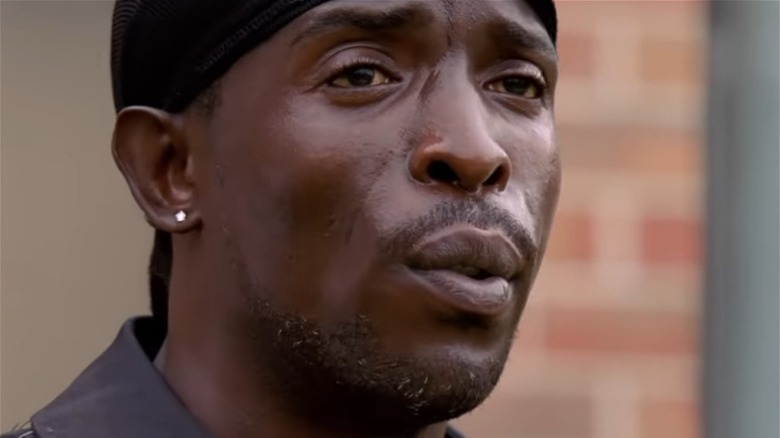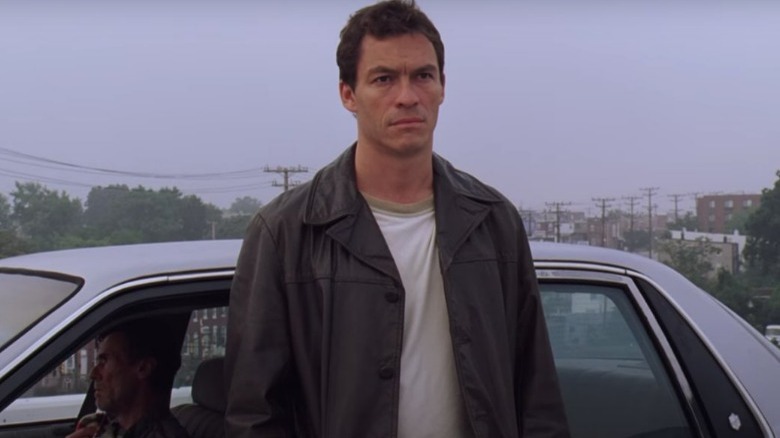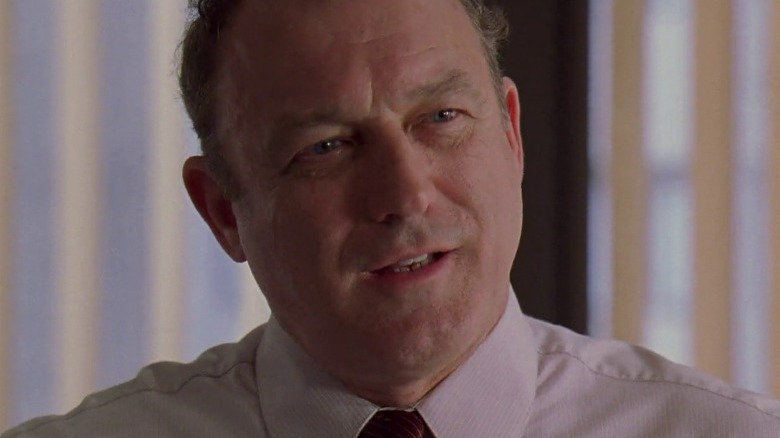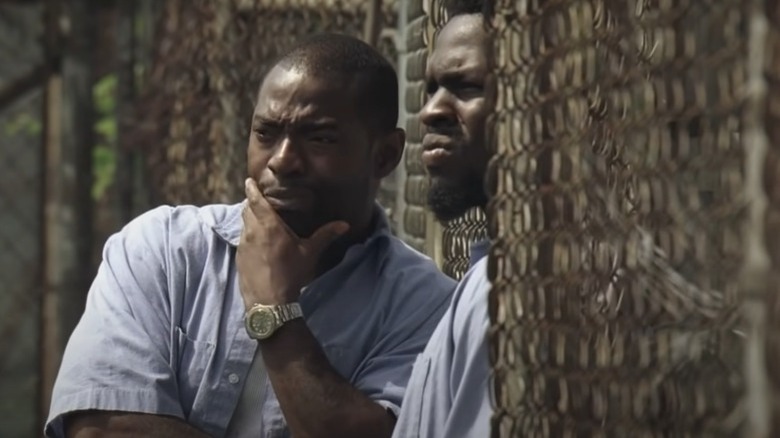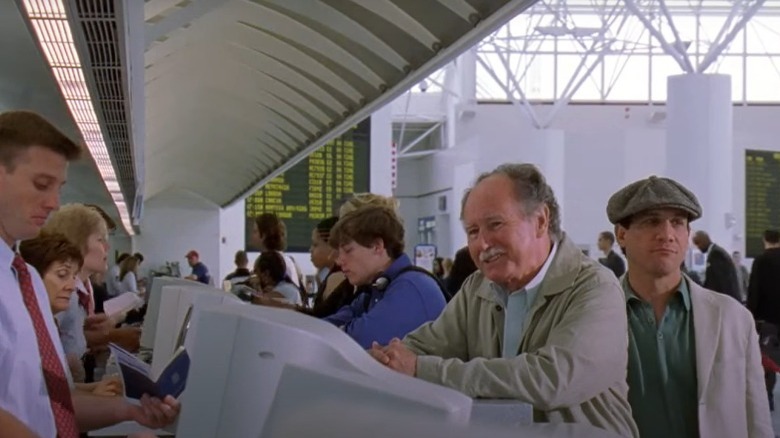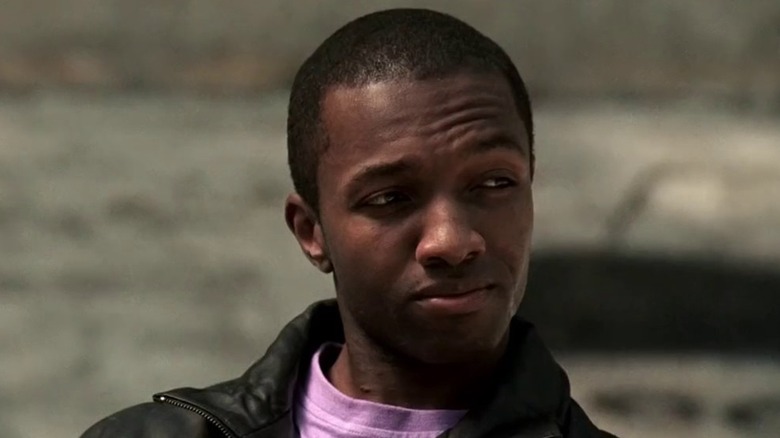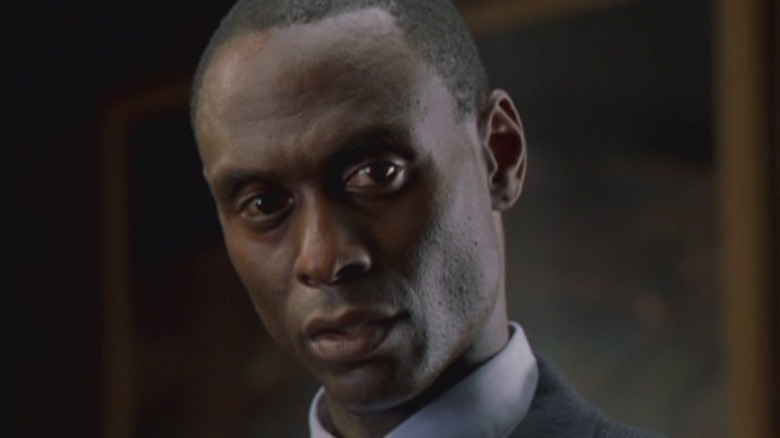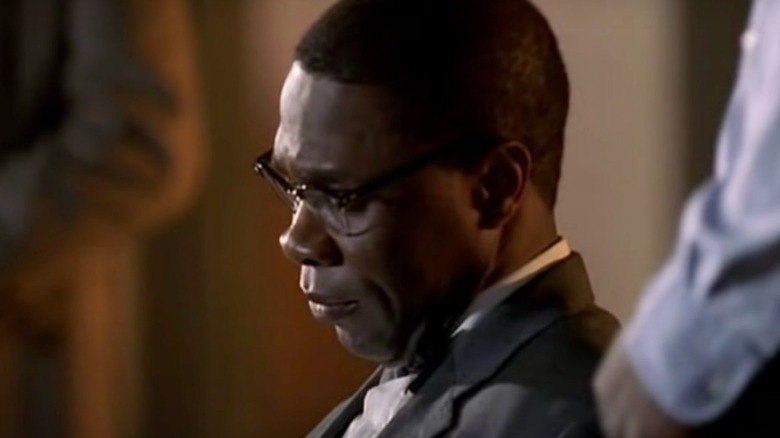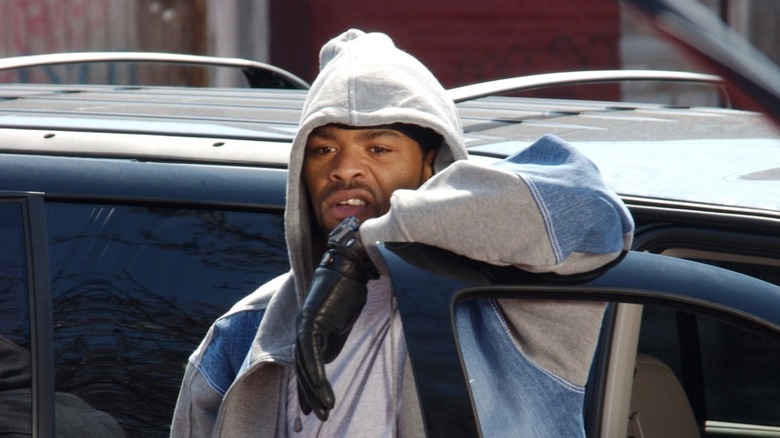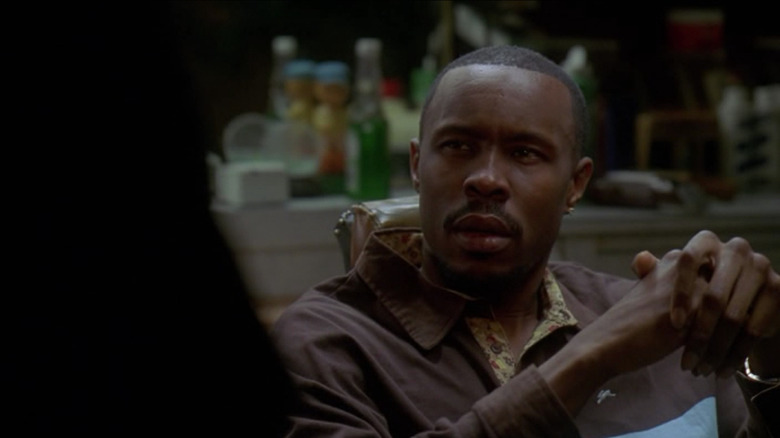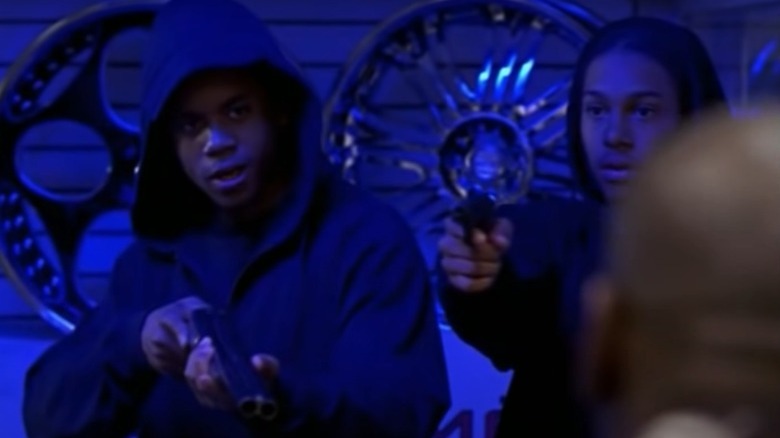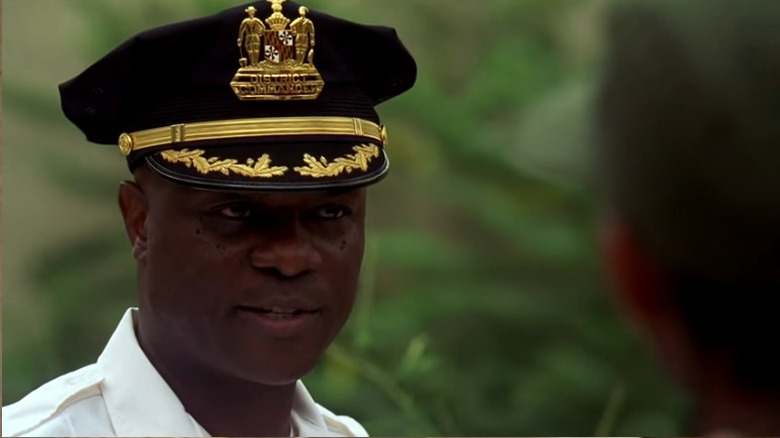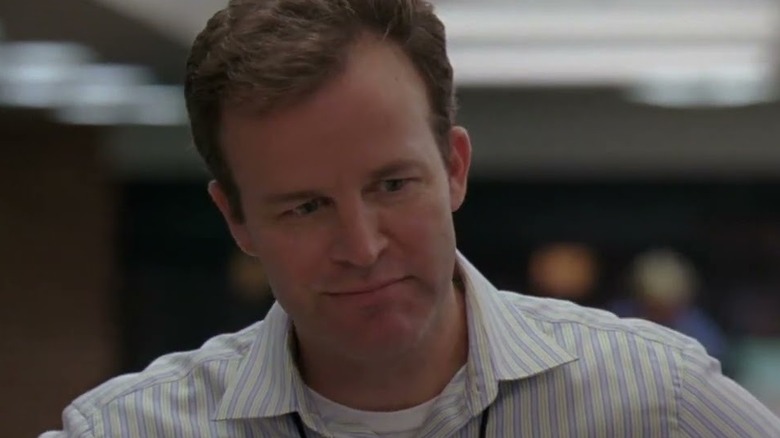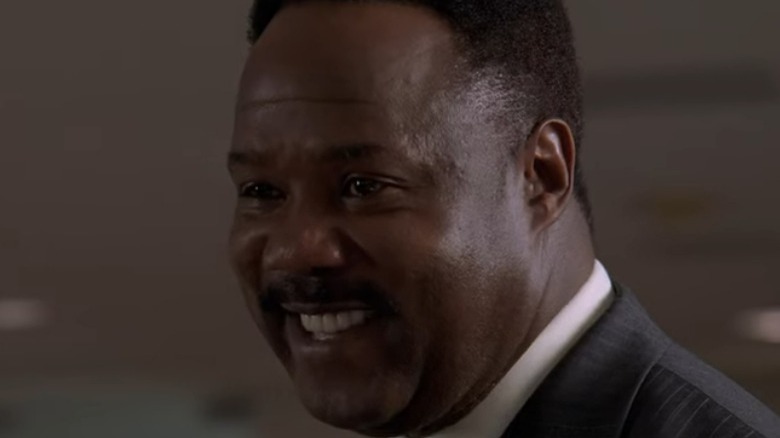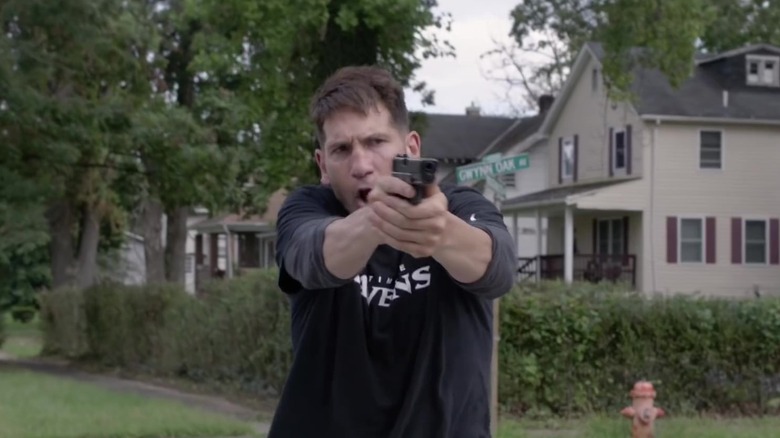The Biggest Unanswered Questions In The Wire
Running for five seasons and helping to launch the careers of the likes of Michael B. Jordan, Idris Elba, Dominic West, and the late, great Michael K. Williams while garnering praise from former President Barack Obama along the way, HBO's "The Wire" remains one of the high-water marks of narrative television.
For half a decade, creator David Simon brought audiences to the streets of Baltimore to HBO for an intimate dive into the ills of the American war on drugs. Its sharp writing, novel-like structure, and brilliant directing placed the show in a reality only an inch or two from our own.
While the show is ultimately bleak – Simon has plainly said the show's a tragedy — its attention to so many characters from all different levels in society gives it a specificity and moments of warmth that are mostly excluded from other police procedurals. Its depiction of life in Baltimore is so specific it's been labeled "Dickensian." However, even with the show's careful plotting and Rube Goldberg machine-esque setups and payoffs, the final few beats of the series don't quite wrap up every thread. In fact, there are a couple of interesting questions left in play before the show's final set of credits roll.
For fans interested in catching up on everything that may still be up in the air in Baltimore, see this list of unanswered questions from "The Wire."
Be warned — spoilers for the series throughout.
What's next for Jimmy?
Detective Jimmy McNulty is the first member of the Baltimore Police department that the audience meets in "The Wire." Played with intelligent, narcissistic charm by Dominic West, Jimmy introduces himself to audiences as the guy who believes he's the smartest guy in the room. To quote Jimmy's superior, Sergeant Jay Landsman: "It makes him an ***hole, but it's also what makes him good po-lice."
Jimmy says what's on his mind to anyone — regardless of rank — and does whatever he thinks is best to close a case. Does it make him unbearable? A little. However, without Jimmy, the show's central plot never gets kicked off. Still, given his temperament and lack of respect for anybody but himself, many viewers were unsurprised to see Jimmy's shenanigans finally get him fired from the Baltimore Police Department at the close of the series.
However, even though the show's final montage closes on Jimmy, it doesn't offer any explanation about what the former detective is going to do next. While Season 5's "-30-" provides some answers about Jimmy's future, like his reconciliation with romantic partner Beadie Russell, it doesn't specifically give the dogged investigator a path. Hopefully, whatever he gets up to after "The Wire" finally gives him some kind of fulfillment — and the occasional excuse to "get a taste" with former partner Bunk Moreland.
Will Rawls ever come out?
One of the series' biggest unanswered questions is originally posed in a blink and you'll miss its appearance from Bill Rawls (John Doman) in Season 3. In a brief scene, set in one of Baltimore's LGBTQ bars, Rawls appears out of uniform and likely off duty in the background.
It happens fast but it introduces a new dimension to the character. Rawls generally serves as the company hammer throughout the core of the series. When he's not coming down on someone for not doing their job, he's coming down on someone else for thinking they can do their job differently. Rawls' marriage and sexuality are never explicitly referenced during the show. However, Simon and the writers chose to include him in that scene.
At a reunion in 2014, Doman told fans he thinks they can determine Rawls' sexuality for themselves (via BuzzFeed). While Rawls — or really any character's (save Omar and Kima) — sexuality is not often made out to be an explicit plot point of the show, it's interesting to consider the layer it might've added to the story. For now, audiences are left to wonder, did Rawls ever come out in his professional and personal life?
Are Wee-Bey and Chris still in the game?
Wee-Bey Brice and Chris Partlow, played by Hassan Johnson and Gbenga Akinnagbe, are not men to be trifled with. Both act as muscle for their respective organizations. Wee-Bey works for Barksdale and Chris works for Marlo, and both rack up quite a body count before the series' end.
In the end, both shooters find themselves admitting to multiple murders and serving life sentences without parole (Wee-Bey is arrested in Season 1 and Chris goes down in Season 5). The show's final montage shows the pair spending time together on the inside. However, the show never makes it explicitly clear how the two men are spending their years in lock up. Specifically, it doesn't answer the question — are the two hitters in or out of "the game?"
"The game," of course, is a phrase from the show's lexicon that's a catch-all for any facet of the drug trade. So at the end of the show are Chris and Wee-Bey in or out? With Wee-Bey's son, Namond Brice, living under the care and protection of Bunny Colvin and the Marlo organization busted up, it appears neither man necessarily has anything to work for. However, as we're often reminded on "The Wire," "the game stays the game." It wouldn't be too hard to imagine a world where the pair kept playing their roles on the inside.
Does the Greek ever catch up to Nicky?
Season 2 of "The Wire" is nobody's favorite. In fact, Michael K. Williams — the brilliant actor behind Omar — said the season's shift in focus to white dock workers initially bothered him. He's likely not alone in his thoughts about the dock union crime storyline. However, Season 2 does move some important pieces into position on Simon's enormous chessboard of a show.
It's the start of Stringer Bell's time in charge of the Barksdale crew. It ends D'Angelo's tragic storyline. And it introduces audiences to the Greek, a shady figure responsible for shipping the bulk of Baltimore's heroin into the city.
However, it mostly it follows the struggle of corrupt dock workers in the Sobotka family — specifically Frank, Nicky, and Ziggy. At the end of the season, Nicky Sobotka is placed in protective custody after informing on the Greek for the murder of Nicky's uncle, dock-worker union rep Frank. Many fans likely felt that Nicky's exit from the show in Season 2 — considering he ratted on an extremely dangerous trafficker — should've been more conclusive. However, he pops back up in Season 5's "The Dickensian Aspect," and apparently he's still a full-time dock worker.
His brief appearance begs the question: did the Greek's organization ever go after Nicky? They certainly don't appreciate informants — see Frank's demise for evidence. Given how meticulous "The Wire ” is about set-up and pay off it's a wonder Nicky is walking the streets of Baltimore worry-free.
Can Marlo ever get back in the game?
Marlo Stanfield (Jamie Hector) is one of the most vicious players to ever play the game. He's smart, absolutely ruthless, and spends the back half of the series building an empire in Baltimore. He even takes out East Side kingpin Proposition Joe.
Eventually, like kingpin Avon Barksdale before him, Stanfield finds himself behind bars and his crew mostly dead, arrested, or dissolved. However, Marlo gets released from prison thanks to the slick work of slimy criminal defense lawyer Maurice Levy (Michael Kostroff). When the audience last sees Marlo he's at a cocktail party trying to drum up some legitimate investments for his newfound millions. However, once he is removed from the game he knows so well, he finds himself adrift in his new surroundings.
Marlo, unable to deal with no longer being in the driver's seat, leaves the networking event, heads back to his old stomping ground, and violently takes back a corner from some young hoppers new to the life. The last time the audience sees Marlo he's standing on his freshly taken territory and the question lingers — will Marlo get back in the game?
While his fate is left ambiguous, it's hard for fans not to wonder what comes of the most ruthless kingpin ever to put a thumb on West Baltimore. For the sake of everybody in Baltimore's central community, here's hoping Marlo remains in legitimate business.
What did Burrell have on Daniels?
In the penultimate episode of Season 1, Cedric Daniels (Lance Reddick) confronts his superior Ervin Burrell (Frankie Faison). Burrell wants Daniels to shut down his special investigation of the Barksdale drug operation because it's beginning to upset lots of people in high positions of power. Daniels says no.
In an effort to get Daniels to cooperate, Burrell attempts to blackmail the steadfast Lieutenant with a nasty FBI file detailing wrongdoing from Daniels' time in the Eastern District. However, Daniels doesn't fold.
It's an interesting scene and works in line with one of the central themes of "The Wire" — there are no pure do-gooders. Only those who chose to do some good from time to time. However, the show never explains what's actually in the file. Did Daniels take money? Did he turn a blind eye to department wrongdoing?
His arc in the show sees him transition from ladder climber to "good po-lice." Considering his turn from an ambitious career man to one of the few officers willing to stand up to the bosses, it's an incredible bit of character work to suggest Daniels may have started out dirty. At the same time, it's a shame the creators never delved into specifics. Not because fans want to see him laid low, but because fans likely always want to know more about the beloved members of the special investigations squad.
What happened to Brother Mouzone?
Brother Mouzone (Michael Potts) is a fan-favorite character whose brief appearance and rapid exit raise plenty of questions.
Brother Mouzone is first mentioned by name in the Season 2 episode "Stray Rounds." As hired muscle for the Barksdale crew, Brother Mouzone makes quite an impression on both the audience and the Westside when he arrives to protect the towers. His formal nature and idiosyncrasies make him stick out among the crowd as much as his signature bowtie pops off his wardrobe. Eventually, Brother Mouzone gets embroiled in a plot that puts him on a direct collision course with Stringer Bell and Omar Little. This ends, of course, with the death of Stringer Bell in Season 3, when Mouzone and Omar team up to ambush the crime lord.
Given the character's impact on the show — he not only killed Bell but also shot Cheese (Method Man) — it's interesting to consider what the character got up to after Season 3. Especially because he remains entirely absent from Seasons 4 and 5. Does he stay in New York? Does he take his services to another city? Is there a world where he winds up in another show's universe (like Albuquerque from "Breaking Bad," for example)? It's hard to know for certain. What's easy to guess is that if Mouzone ever got his own spin-off, fans would tune in.
Do Cheese and Randy ever acknowledge their relationship?
Melvin "Cheese" Wagstaff — portrayed by the Wu-Tang Clan's Method Man — isn't exactly a fan-favorite character. He's vindictive, a bit short-sighted, violent, and mean to dogs. However, eagle-eyed fans may notice Cheese isn't the only Wagstaff on the show. There's also Randy Wagstaff, one of the doomed schoolchildren "The Wire" spotlights in Season 4.
In a 2008 interview about the show, creator David Simon confirmed Randy was Cheese's son. However, he also said they never explicitly addressed it on the show because "it would not have added to the overall theme or to either of those characterizations of Cheese or Randy."
Still, since Simon and company made a conscious decision to include the character detail in their world without ever turning it into a plotline on the show, fans may be left with some questions. Did Randy and Cheese ever reconcile their relationship before Cheese's Season 5 death? Does Randy ever discover how or why his dad died? Will he follow in his father's footsteps and get into the game?
Is Avon a kingpin in prison?
Avon Barksdale — the original special investigation unit's target and once feared kingpin of West Baltimore — finds himself charged with 25 years following his arrest in the Season 3 finale. The character, imbued with equal parts swagger and malice by actor Wood Harris, is arguably one of the series' most impactful players. He's responsible for most of the series' early conflict and even calls a guy like Stringer Bell too soft for the game.
However, in the show's back half, Seasons 4 and 5, Avon is relegated to name checks and brief appearances like his Season 5 sit-down with Marlo Stanfield.
So the question remains — is Avon Barksdale out of the game? Or does he reside over a new fiefdom from prison? "The Wire” never explicitly answers these questions before it wraps, although it's hard to imagine a man as dedicated to the game as Avon ever taking the straight and narrow path.
Is Michael making it as the new Omar?
"The Wire" is broadly about the tragic ways our public institutions fail. The tragedy comes from the fact that no matter how outside the box or system any character tries to go to shake things up — think McNulty's approach to police work or Stringer's attempt to get into legitimate business — sooner or later the system always returns to status quo.
So in its closing moments, when "The Wire" finally says goodbye to its fictional take on Baltimore, the audience is reminded of what's changed and what hasn't. Michael Lee — played by Tristan Wilds and first introduced in Season 4 — serves as a great example of this phenomenon. When the audience meets Michael, he's an innocent trying to get by in school and hang out with his friends. However, over the course of Seasons 4 and 5, the audience watches as Michael learns the rules of the game, abandons his family and friends, and eventually takes over as a Baltimore shotgun-toting stick-up man — just like Omar Little before him.
While his tragic plot line illustrates one of the show's themes about society's overall refusal to change, it also raises some unresolved questions. Does Michael find success in Omar's old position? Does he garner the same reputation? And will he ever get out of the game or is he doomed to the same fate as Omar? Mr. Simon, if you're reading this, the fans would love to know.
Does anyone attempt a Hamsterdam again?
Season 3 of "The Wire ” sees one district of the Baltimore Police Department decriminalize drugs. Worried he may not impact any changes on his community before retirement, Major Howard "Bunny" Colvin decides to legalize the sale of drugs in a few dilapidated blocks in the Western district. It's quickly monikered, "Hamsterdam."
Colvin's efforts eventually pay off. Social workers can care for users and decrease violent crime because the dealers operate out of a single controlled area. However, this being "The Wire," when the bosses get wind of Colvin's operation, they freak out and immediately shut the whole thing down. All of Colvin's success is almost immediately undone by the season's end.
Given the initial success of Colvin's experiment, some fans may wonder if anybody in Baltimore ever tried to recreate Hamsterdam again. Colvin certainly makes a convincing argument for his "brown bag" approach to community policing. Given the slew of bodies dropped in Seasons 4 and 5 by the Stanfield crew, it wouldn't be too surprising if somebody tried to resurrect Hamsterdam or something like it.
What happens to the staff at the Baltimore Sun?
Creator David Simon spent most of his journalism career writing at the Baltimore Sun (via The New York Times) and he introduces a fictionalized version of the paper in Season 5. Its plotlines intersect with the special investigation unit's latest case and spotlight the struggles local newsrooms faced at the time. The Baltimore Sun storyline also introduces audiences to Scott Templeton (Tom McCarthy), an unscrupulous journalist who lies to get more recognition.
Even though Scott's suspected of lying by his peers, he's never publicly shamed for plagiarizing stories. He even goes on to win a Pulitzer Prize for his work. Considering Scott clears the main storyline without ever being found out, some fans may wonder if he ever did get caught red-handed lying in print.
However, since the Baltimore Sun only appears in one season of "The Wire," Scott and The Baltimore Sun's other reporters make their impressions on the audience and quickly exit the show. It's understandable that Simon wanted to include newsroom struggles in his show given his experience, but the limited time with the team members of the Baltimore Sun means most of their plotlines result in lingering questions. For instance, will Scott's Pulitzer Prize-winning but largely fabricated story ever end up coming back to haunt him, as it did the real journalist whose story inspired the plot line?
Does Clay Davis ever get caught?
Played with menacing charm by Isiah Whitlock Jr., Senator Clay Davis represents one of the worst outcomes of the drug war: corrupt politicians. When Davis isn't fleecing the likes of Baltimore mayoral candidate Thommy Carcetti for money, he's fleecing drug kingpins like Stringer Bell for quick cash. He launders money (and collects a fee) from drug dealers and will take "campaign contributions" from just about anybody. He's as bad as they come.
And in the end? He gets away. When Clay goes on trial for corruption in Season 5, he defends himself on the stand and gets off. He even embarrasses up-and-coming Prosecutor Bond in the process since the case against Davis appeared to be a lock. All of this begs the question — what becomes of Senator Clay Davis? Is he ever held accountable for his actions or will he keep running roughshod over the people of Baltimore for the foreseeable future? Plus, some fans may be wondering if Prosecutor Bond's career ever recovered after whiffing his case against Davis.
Does anybody learn anything?
After the credits roll on the final scene of "The Wire," fans may find themselves asking if anybody in Baltimore learns anything. This question is a bit of a cheat because the fictional higher-ups in Simon's Baltimore clearly didn't learn a thing before the show's end. Plus, HBO released a mini-series in 2022 that argues that the game, the powers that be, and the city itself remain unchanged — and are all probably worse off now than when "The Wire" left them.
This mini-series, titled "We Own This City," stars Jon Bernthal and was created by the brain trust behind "The Wire." It details the crimes and eventual investigation of the real-life Gun Trace Task Force unit of the Baltimore Police Department. It is, in a word — fantastic. It's also, like so many things David Simon's involved with, very depressing.
It also plays like a final word on Simon's thoughts about America's war on drugs. As "We Own This City" unfolds, it argues the corrupt police unit at its center is a feature of a system built on broken drug policies, not a bug. In fact, sometimes "We Own This City" seems like Simon's nod to all the problems presented on "The Wire" and the fact that they've largely gone ignored. It's bleak, but it's riveting to watch and very, very well made. Any fan of "The Wire" looking to dip back into the world of Baltimore policing should look no further than "We Own This City."
